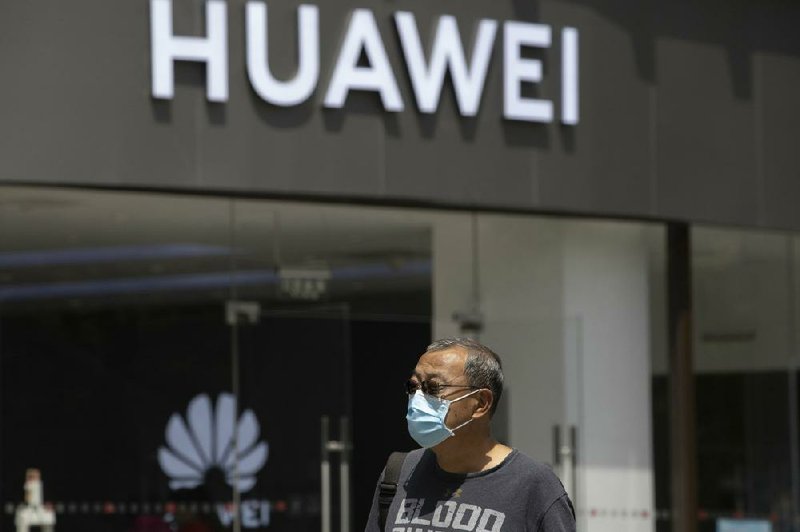VANCOUVER, British Columbia -- A Canadian judge ruled Wednesday that the U.S. extradition case against a senior Huawei executive can proceed to the next stage, a decision that is expected to further harm relations between China and Canada.
The Chinese Embassy in Ottawa later warned Canada to drop the case and accused the United States of trying to bring down the Chinese tech giant.
Canada arrested Meng Wanzhou, the daughter of Huawei's founder and chief financial officer of the company, at Vancouver's airport in late 2018. The U.S. wants her extradited to face fraud charges. Her arrest infuriated Beijing. Canadian officials have emphasized the country's judicial system is independent of the government.
Associate Chief Justice Heather Holmes of the British Columbia Supreme Court on Wednesday dismissed Meng's request to throw out the case, ruling that it meets a key test of Canada's extradition law known as double criminality -- or whether the alleged crime in the U.S. would also be a crime in Canada.
The U.S. claims Meng, 48, committed fraud by lying to banks including HSBC Holdings Plc and tricked them into processing more than $100 million in transactions through the U.S. in breach of sanctions.
Meng's lawyers argued during a hearing in January that the U.S. was disguising its sanctions-violations allegation as a fraud charge in order to get around the double-criminality rule. Had they taken place in Canada, the banking transactions at issue wouldn't have violated any Canadian sanctions, they said.
Holmes rejected the argument, saying fraud can be prosecuted in Canada if a U.S. bank was put at economic risk for violating U.S. sanctions.
"Ms. Meng's approach to the double criminality analysis would seriously limit Canada's ability to fulfill its international obligations in the extradition context for fraud and other economic crimes," Holmes wrote.
Holmes said Canada did not have economic sanctions against Iran at the time but noted the sanctions used by the U.S. "were not fundamentally contrary to Canadian values."
Meng's legal team is scheduled to be back in court next Wednesday to set dates for when her lawyers will argue that Canada Border Services, the Royal Canadian Mounted Police and the FBI violated Meng's rights while collecting evidence before she was actually arrested. Extradition cases typically take years in Canada.
The ruling against Meng is expected to erode already damaged relations between Beijing and Ottawa.
"China hereby expresses strong dissatisfaction and firm opposition to this decision, and has made serious representations with Canada," the Chinese embassy in Ottawa said in a statement.
"The purpose of the United States is to bring down Huawei and other Chinese high-tech companies, and Canada has been acting in the process as an accomplice of the United States. The whole case is entirely a grave political incident," the statement said.
China's embassy also warned Canada to "immediately release Ms. Meng Wanzhou to allow her to return safely to China, and not to go further down the wrong path."
In apparent retaliation for Meng's arrest, China detained former Canadian diplomat Michael Kovrig and Canadian entrepreneur Michael Spavor. China has also placed restrictions on various Canadian exports to China, including canola oil seed. China also handed a death sentence to a convicted Canadian drug smuggler in a sudden retrial.
The pursuit of Meng by U.S. authorities predates the Trump administration: Officials had been building a case against her since at least 2013, three years before Trump was elected president.
Huawei is the biggest global supplier of network gear for phone and internet companies and some analysts say Chinese companies have flouted international rules and norms during allegations of technology theft. The company represents China's progress in becoming a technological power and has been a subject of U.S. security concerns.
Ahead of the decision, Meng posed for photos on the court steps this past weekend, giving a thumbs-up sign. She showed up to court on Wednesday wearing a black dress and an ankle bracelet.
"Huawei is disappointed in the ruling," Huawei said in a statement. "We expect Canada's judicial system will ultimately prove Ms. Meng's innocence."
Canada's Justice Department said in a statement that a judge at further hearings will determine whether Meng's conduct provides sufficient evidence of fraud to meet the test for extradition.
"An independent judge will determine whether that test is met. This speaks to the independence of Canada's extradition process," the statement said. "The Minister does not personally make any decisions related to an extradition proceeding until and unless the judge commits the person for extradition."
Information for this article was contributed by Jim Morris and Rob Gillies of The Associated Press and by Natalie Obiko Pearson of Bloomberg News.
Business on 05/28/2020
